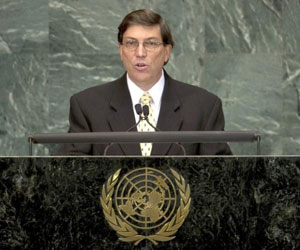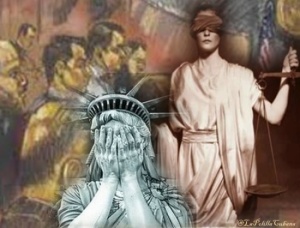
STATEMENT BY H.E. MR. BRUNO RODRIGUEZ PARRILLA, MINISTER FOR FOREIGN AFFAIRS OF THE REPUBLIC OF CUBA, ON BEHALF OF THE COMMUNITY OF LATIN AMERICAN AND CARIBBEAN STATES (CELAC) AT THE GENERAL DEBATE OF THE SIXTY EIGHTH SESSION OF THE UNITED NATIONS GENERAL ASSEMBLY.
NEW YORK, SEPTEMBER 26, 2013.
Mr. President:
I am honored to take the floor on behalf of the Community of Latin American and Caribbean States (CELAC) which Cuba is honored to preside. I would like to reiterate to you our satisfaction over your election as President of the Sixty Eighth Session of the General Assembly and our willingness to cooperate in order to contribute to the successful performance of your mandate. It is an honor for CELAC to see that a representative from one of its member States, particularly a Caribbean nation, is presiding over this top organ of the United Nations.
Mr. President:
CELAC, the first genuinely Latin American and Caribbean organization made up by all countries in the region, was founded with the purpose of advancing in the political, economic, social and cultural unity and integration of Our America, thus vindicating the dream of our liberators of having a Nation of Republics that, with its almost 600 million inhabitants, its resources and its enormous human, natural and economic potential could autonomously decide upon its own destiny.
This has been the consequence of the conviction that prevails among the countries of our region, as was expressed at the CELAC Founding Summit held in Caracas on December 2 and 3, 2011, which stated that the unity and political, economic, social and cultural integration of Latin America and the Caribbean constitute both a fundamental aspiration of the peoples represented here, and a requirement for the Region to successfully confront the challenges before us.
However, all that has been done and the path taken by CELAC stresses the necessity of having our own regional space that consolidates and projects the Latin American and Caribbean identity based on shared principles and values; and on the ideals of unity and democracy of our peoples and reiterated our commitment to the building of a more just, equitable and harmonious international order based on respect for International Law and the principles of the Charter of the United Nations and to the defense of sovereignty and the right of any State to establish its own political system, free from threats, aggressions and unilateral coercive measures in an environment of peace, stability, justice, democracy and respect for human rights.
Our Community is founded on the unrestricted respect for International Law, the peaceful settlement of disputes, the prohibition of use and threatened use of force, respect for self determination, for sovereignty, territorial integrity, non-interference in the internal affairs of each country, protection and promotion of all human rights, the Rule of Law at national and international levels and democracy, as well as on our purpose to work together in the interest of everyone’s prosperity so as to eradicate discrimination, inequalities and marginalization, violations of human rights, and transgressions of the Rule of Law.
We reaffirm the region’s commitment with international peace and security and we commit ourselves to reinforce the climate of peace that prevails in Latin America and the Caribbean and consolidate a Zone of Peace in all of our region, where differences between nations are resolved peacefully and through dialogue and negotiation or other forms of solution, in full conformity with International Law.
At the recently held High Level Meeting on Nuclear Disarmament CELAC reiterated our deep concern about the threat posed to humanity by the continued existence of nuclear weapons and their possible use or threat of use, and the urgent need to advance towards the attainment of the priority objective of nuclear disarmament and the achievement of a total and absolute elimination of nuclear weapons.
CELAC member countries have also presented, for the first time, a joint initiative at the Human Rights Council on the Right to Peace, which should turn into a Declaration on said issue that we hope could be approved by this General Assembly.
We have reiterated CELAC’s strongest support to the legitimate rights of Argentina in the dispute over the sovereignty of the Malvinas Islands and the permanent interest of the region in a resumption of negotiations between Argentina and the United Kingdom in order to find, at the earliest possible date, a peaceful and final solution to this dispute.
Our community reiterates its support to the dialogue process that is being held between the Colombian Government and the FARC, intended to put an end to the internal conflict that has affected the political, social and economic development of that sister nation for more than 50 years, and pleads for the success of the initiative leading to an agreement in the interest of the Colombian people.
We also highlight the Latin American and Caribbean character of Puerto Rico and, by noting the resolutions on Puerto Rico adopted by the United Nations Special Committee on Decolonization, considers it is an issue of interest to CELAC.
We reiterate our absolute condemnation of terrorism and reaffirm our commitment to combat it in all its forms and manifestations, in accordance with the United Nations Global Strategy in this field, while we strongly reject the unilateral and illegitimate assessments, lists and certifications made by some developed countries which affect countries of the region, in particular, those referring to terrorism, drug trafficking, human trafficking and other related measures.
Therefore, in recent days, after the situation in Syria worsened, CELAC reiterated its vocation for peace and observance of the principles enshrined in the United Nations Charter and International Law, including the International Humanitarian Law, and demanded that the necessary conditions are created to move on towards a negotiated political solution to the Syrian conflict, which has taken a toll on the lives of thousands of innocent people.
Likewise, we are moving towards the structuring of autonomous cooperation concepts and mechanisms in the context of CELAC and we have renewed our cooperation with the sister Republic of Haiti and urged the international community to continue paying a contribution to the reconstruction efforts and the sustainable development of that country, in accordance with the fundamental priorities and needs defined by the Haitian Government, with full respect for its authority and sovereignty and the principle of non-interference in the internal affairs of countries.
We have defended the sovereignty of the region, including the permanent sovereignty over our national resources, and we have expressed our solidarity with the CELAC member countries in the face of acts that are harmful and violate International Law, such as the events occurred on July 2 last against the dignity and the rights of the President of the Multi-national State of Bolivia, Evo Morales Ayma, upon his return to La Paz after travelling through several European countries.
The Community has emphasized our intention that, taking into consideration the diverse processes that formed the Latin American and Caribbean identity, CELAC must become a space that protects the right of all cultures, races and ethnic groups of the countries of the region to existence, preservation and coexistence, as well as the multicultural character of our peoples, and the plurinational character of some of our countries, especially of the native communities recreating and promoting their historical memory, their ancestral knowledge and experience.
At this General Debate, almost seven months after his physical disappearance, CELAC pays a well deserved tribute to one of its main founders and promoters, President Hugo Chávez Frías, who presided over, with his vision and mastery, the Founding Summit of our Community.
Likewise, CELAC expressed its satisfaction over the election of Pope Francis as the first High Pontiff of the Catholic Church from Latin America and the Caribbean.
The global espionage against CELAC member countries, which vulnerates the human rights, the right to privacy and the right to information of citizens is a violation of the principle of sovereignty of States and International Law, has become a source of concern and we have taken due note of the statements made in different fora by Heads of States and Government and other leaders of Latin American and Caribbean countries who have condemned and rejected the use of such practices.
We, the CELAC member States, feel proud of being able to work together to consolidate our regional sovereignty, so that Latin America and the Caribbean could occupy the place they legitimately deserve in the world, so that our region will no longer be the most unequal in the planet.
In pursuing these objectives, we have decided to offer our cooperation and solidarity to those vulnerable and less developed countries of the region and call the attention on the specific vulnerabilities of CARICOM countries, in their condition as Small Developing Island States, which limit their efforts towards sustainable development, taking into account the significant impact of natural disasters and the negative effects of climate change.
With regard to the indispensable reform of the international system, we have renewed our countries’ commitment to multilateralism and a comprehensive reform of the United Nations system, and to the democratization of international decision making instances, in particular, the Security Council.
And so we will do with other issues that are equally important, among them, the process of formulation of the Post 2015 Development Agenda, an item to be discussed at this General Debate, to which all CELAC members countries attach a crucial importance.
We, the members of CELAC are aware of the fact that there can be no lasting peace without development and without combating poverty, hunger and inequality and of the challenges that the current international economic and financial crisis poses to the future of our region and our legitimate aspirations for social inclusion, equitable growth, and Sustainable Development and integration.
Thus, we highlight the importance that the Post-2015 Development Agenda consists of voluntary, universal, clear and quantifiable goals adaptable to distinct national realities, with the purpose of eradicating poverty and promote sustainable development. This new framework should be inclusive, transparent, and promote compliance with the commitments entered into by developed countries in the Official Development Assistance and encourage South-South and Triangular Cooperation on cross-cutting issues through the participation of all socials sectors.
With regard to climate change, we welcome the formal adoption of the second period of commitments of Kyoto Protocol, despite the absence of political will on the part of several developed nations that prevented the achievement of agreements on fresh financial additional and predictable resources and mechanisms for the effective transfer of technologies to developing countries. We will continue working together to cope with that scourge that is today affecting humanity as a whole.
Mr. President:
The difficulties are huge, but the important thing is that the Latin American and Caribbean countries have come to the conclusion that the time has come for the region, as was said by José Martí, to walk in close ranks, like silver in the roots of the Andes, and it is for this reason that we have created CELAC.
Thank you, very much.










